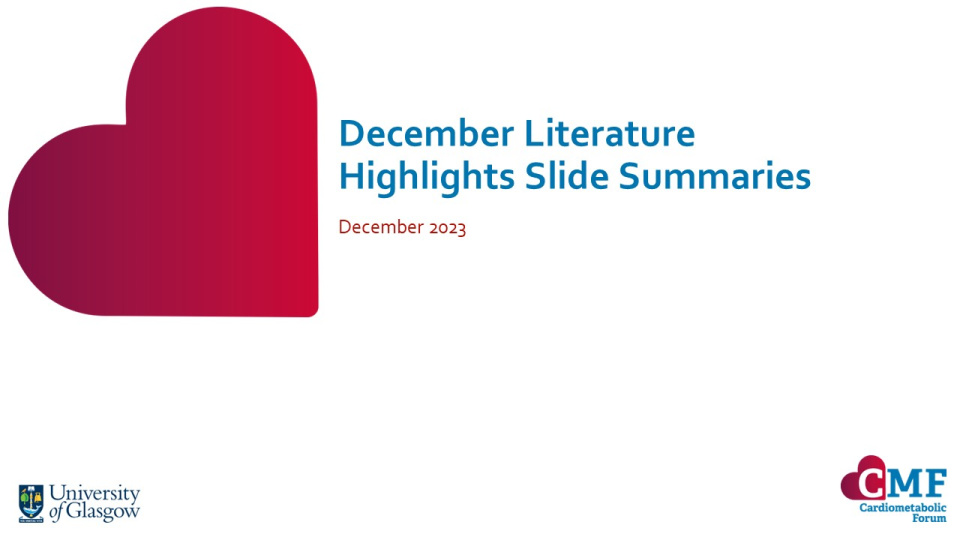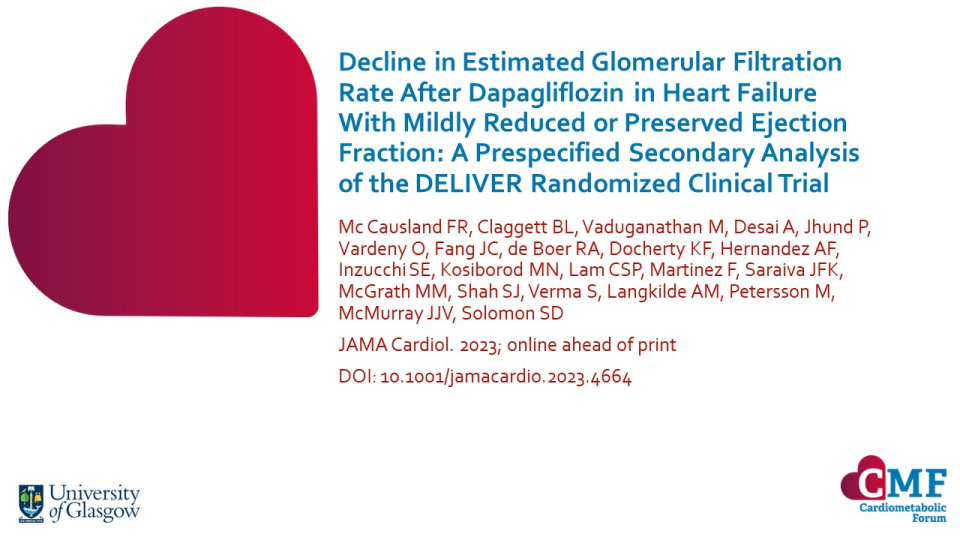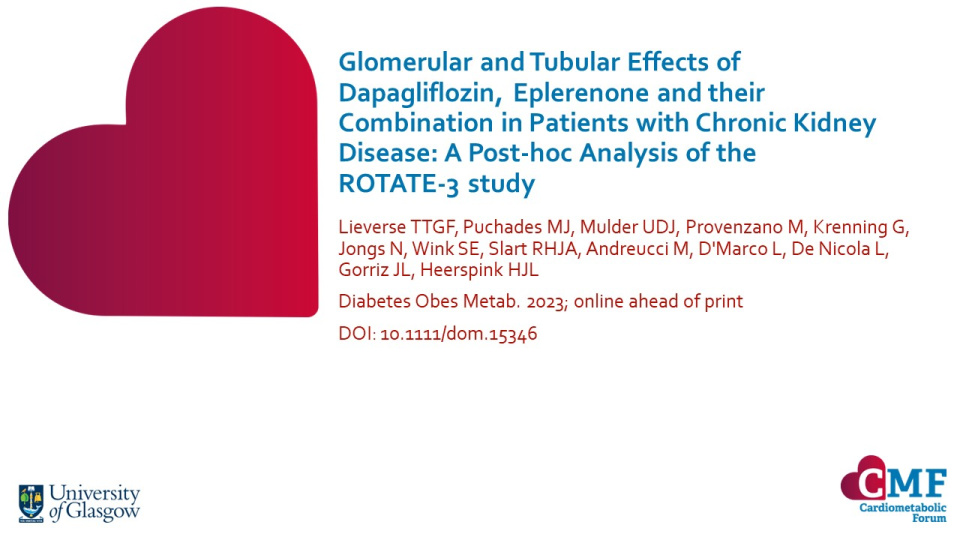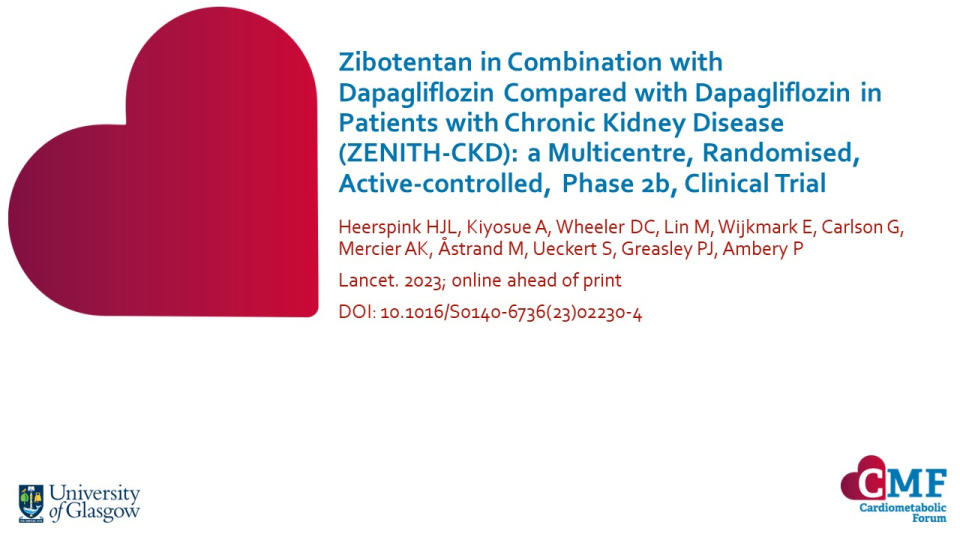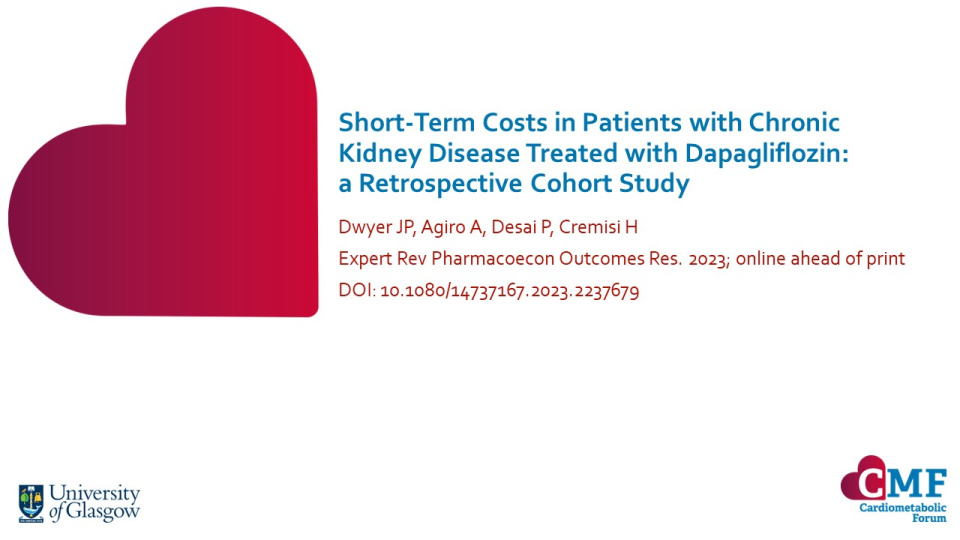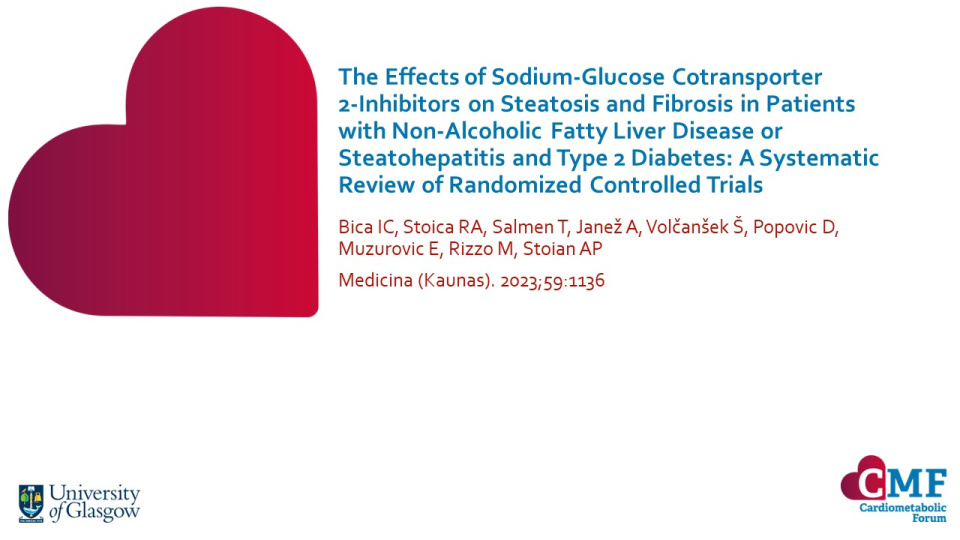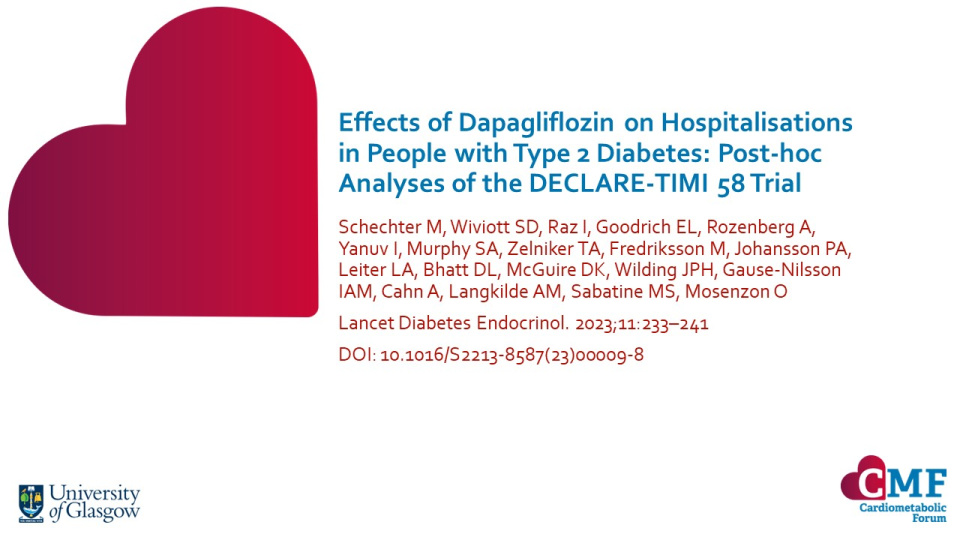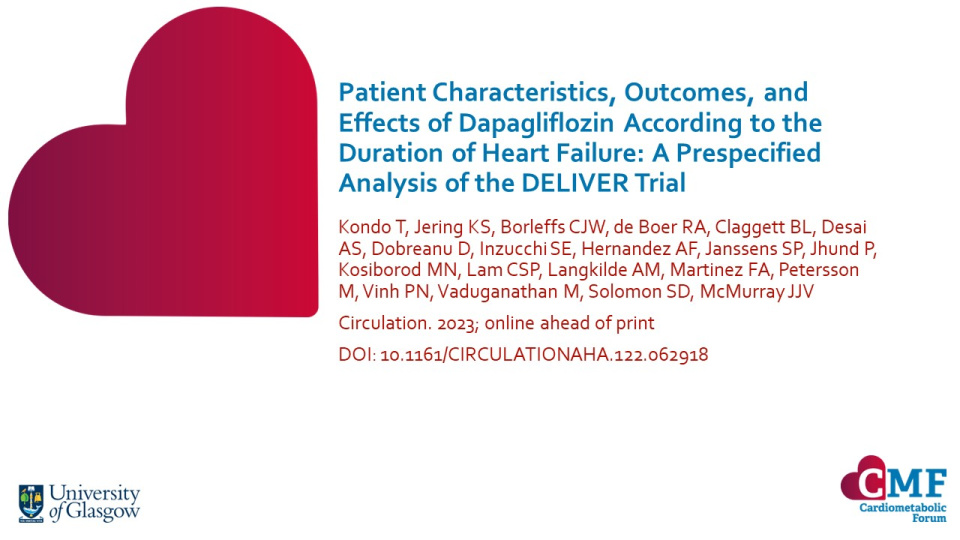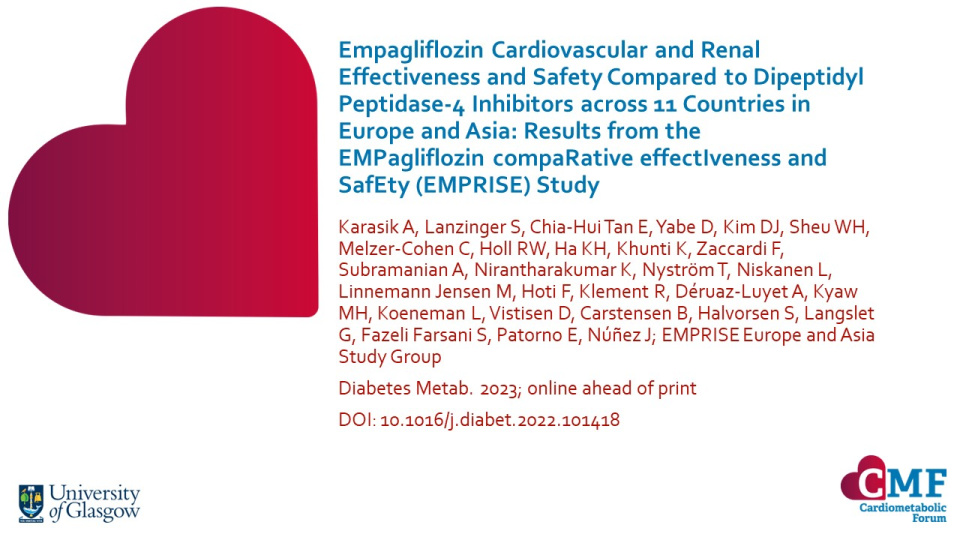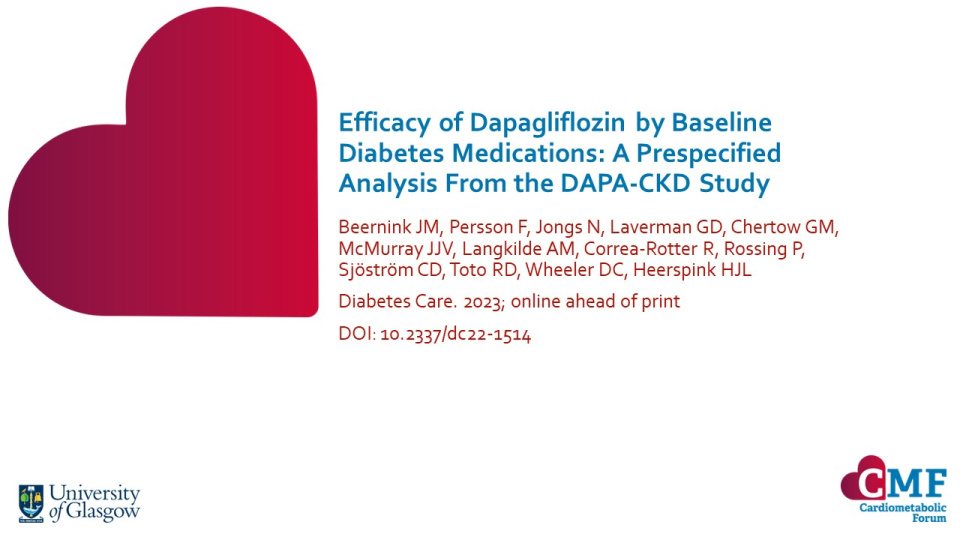Publications
Stay up to date with our literature reviews which are curated by experts to feature the most important publications released each month. Explore our publications for access to concise summary slides for your own use.
Decline in Estimated Glomerular Filtration Rate After Dapagliflozin in Heart Failure With Mildly Reduced or Preserved Ejection Fraction: A Prespecified Secondary Analysis of the DELIVER Randomized Clinical Trial
JAMA Cardiol. 2023; online ahead of print DOI: 10.1001/jamacardio.2023.4664
An initial decline in eGFR often occurs after initiating a SGLT2i and has been observed in patients with diabetes, CKD and HF. A prespecified analysis of DELIVER evaluated the magnitude and frequency of an initial decline in eGFR (within the first month) and its association with CV and renal outcomes in 5,788 patients with HFpEF or HFmrEF.
Keywords:
Glomerular and Tubular Effects of Dapagliflozin, Eplerenone and their Combination in Patients with Chronic Kidney Disease: A Post-hoc Analysis of the ROTATE-3 Study
Diabetes Obes Metab. 2023; online ahead of print DOI: 10.1111/dom.15346
The ROTATE-3 cross-over trial in 46 adults with CKD and urinary albumin excretion ≥100 mg/24 h showed that dapagliflozin combined with eplerenone led to robust additive reductions in albuminuria compared with either agent alone. This post-hoc analysis aimed to characterise the effects of dapagliflozin, eplerenone and the combination on markers of glomerular and tubular function to better understand the mechanisms responsible for albuminuria lowering.
Keywords:
Zibotentan in Combination with Dapagliflozin Compared with Dapagliflozin in Patients with Chronic Kidney Disease (ZENITH-CKD): a Multicentre, Randomised, Active-controlled, Phase 2b, Clinical Trial
Lancet. 2023; online ahead of print DOI: 10.1016/S0140-6736(23)02230-4
The risk of kidney failure persists in many patients with CKD, even when receiving optimal treatment including SGLT2i. Increased expression of endothelin-1 may contribute to CKD progression through several pathophysiological effects; however, high doses of non-selective endothelin receptor antagonists (ERAs) have been linked with fluid retention.
Keywords:
Short-Term Costs in Patients with Chronic Kidney Disease Treated with Dapagliflozin: a Retrospective Cohort Study
Expert Rev Pharmacoecon Outcomes Res. 2023; online ahead of print DOI: 10.1080/14737167.2023.2237679
Analyses have found that dapagliflozin is cost-effective in the long term in patients with non-diabetic CKD and in patients with CKD with or without T2D. The slowing of eGFR decline and the early reduction in HF hospitalisation seen with dapagliflozin suggest that there is potential for short-term cost benefits in patients with CKD; however, there is a lack of real-world evidence. This retrospective observational cohort study described the impact of dapagliflozin on short-term medical costs in propensity matched patients with stage 3 CKD.
Keywords:
The Effects of Sodium-Glucose Cotransporter 2-Inhibitors on Steatosis and Fibrosis in Patients with Non-Alcoholic Fatty Liver Disease or Steatohepatitis and Type 2 Diabetes: A Systematic Review of Randomized Controlled Trials
Medicina (Kaunas). 2023;59:1136 DOI: 10.3390/medicina59061136
T2D and NAFLD/NASH share common causal pathways. As a class of glucose-lowering agents with well-established cardiovascular benefits, SGLT2i have been studied for effects on steatosis and fibrosis in patients with NAFLD or NASH. A systematic review was conducted to examine the efficacy of SGLT2i on NAFLD/NASH in patients who also had T2D.
Keywords:
Effects of Dapagliflozin on Hospitalisations in People with Type 2 Diabetes: Post-hoc Analyses of the DECLARE-TIMI 58 Trial
Lancet Diabetes Endocrinol. 2023;11:233–241 DOI: 10.1016/S2213-8587(23)00009-8
In patients with T2D at high risk of CV or kidney disease, SGLT2is consistently reduce the risk of HF hospitalisations. Less is known about their effects on hospitalisation from any cause, especially in patients with T2D without ASCVD, which includes most of the global population with T2D. Post hoc analyses of DECLARE-TIMI 58 assessed the effect of dapagliflozin on the risks of hospitalisations for any cause and for specific causes in patients with T2D with and without ASCVD.
Keywords:
Patient Characteristics, Outcomes, and Effects of Dapagliflozin According to the Duration of Heart Failure: A Prespecified Analysis of the DELIVER Trial
Circulation 2023; online ahead of print DOI: 10.1161/CIRCULATIONAHA.122.062918
Whether the efficacy and safety of SGLT2i therapy are maintained with increasing duration of HFmrEF or HFpEF is unknown. In this prespecified analysis of DELIVER, HF duration was categorised as ≤6 months, >6 to 12 months, >1 to 2 years, >2 to 5 years, or >5 years.
Keywords:
Empagliflozin Cardiovascular and Renal Effectiveness and Safety Compared to Dipeptidyl Peptidase-4 Inhibitors across 11 Countries in Europe and Asia: Results from the EMPagliflozin compaRative effectIveness and SafEty (EMPRISE) Study
Diabetes Metab. 2023; online ahead of print
Previously, the real-world EMPRISE US study found that empagliflozin initiation was associated with a lower risk of hospitalisation for HF, all-cause mortality and CV events when compared with DPP-4i.
Keywords:
Efficacy of Dapagliflozin by Baseline Diabetes Medications: A Prespecified Analysis From the DAPA-CKD Study
Diabetes Care. 2023; online ahead of print DOI: 10.2337/dc22-1514
Achieving optimal glucose control can be challenging in patients with T2D and CKD because impaired kidney function hampers the use of several oral or injectable glucose-lowering therapies (GLTs) and increases the likelihood of hypoglycaemia. This prespecified analysis from the DAPA-CKD trial evaluated whether the benefits of dapagliflozin in patients with T2D and CKD varied by background GLT number or class.

